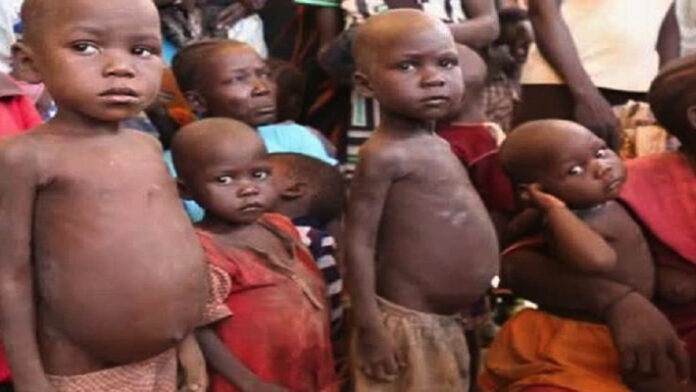By Jeph Ajobaju, Chief Copy Editor
Nigeria has the highest malnutrition rate in Africa, and the second highest in the world, with about 17 million of its children “undernourished”, which results in them being “stunted and/or wasted”.
The United Nations Children’s Fund (UNICEF), which gave the latest statistics, warns that Nigeria is off-track to achieve SDG2: Zero Hunger by 2030.
Nigerian children under the age of two are not getting the food or nutrients they need to thrive and grow well, leading to irreversible developmental harm, UNICEF says in a new report titled “Fed to Fail? The crisis of children’s diets in early life”.
It cites rising poverty, inequality, conflict, climate-related disasters, and health emergencies such as the pandemic, as contributing to nutrition crisis among the world’s youngest for 10 years running, per reporting by The PUNCH.
“The findings of the report are clear: millions of young children are not being fed diets adequate for their growth and development,” said UNICEF Nigeria Deputy Representative, Rushnan Murtaza.
“Poor nutritional intake in the first two years of life can harm children’s rapidly growing bodies and brains, impacting their futures.
“Now more than ever, with the ongoing COVID-19 disruptions, we need to reimagine a food system that improves the diets of young children, including in Nigeria.”
UNICEF finds that half of children aged six to 23 months in 91 countries, including Nigeria, are not being fed the minimum recommended number of meals a day. Two-thirds also do not consume the minimum number of food groups they need to thrive.
Minimum dietary diversity, frequency
The 2018 Nigeria Demographic and Health Survey also shows that among children aged six to 23 months in Nigeria, only 23 per cent have the minimum necessary dietary diversity, and only 42 per cent have minimum adequate meal frequency.
“As COVID-19 continues to disrupt essential services and drive more families into poverty, the report finds that the pandemic is affecting how families feed their children,” UNICEF adds.
“According to a study conducted in Nigeria last year, Nigerians were already largely unable to afford healthy diets due to pre-existing food security challenges, with an estimated 40.1 per cent of Nigerians unable to cater for their food expenditure. It is likely that this will only be worsened by the COVID-19 pandemic.
“Children carry the scars of poor diets and feeding practices for life. An insufficient intake of nutrients found to support growth at an early age puts children at risk of poor brain development, weak learning, low immunity, increased infections and, potentially, death.
“Children under the age of two are most vulnerable to all forms of malnutrition – stunting, wasting (low weight for height), micronutrient deficiencies, overweight and obesity – as a result of poor diets, due to their greater need for essential nutrients per kilogram of body weight than at any other time in life.
“Globally, UNICEF estimates that more than half of children under the age of five with wasting – around 23 million children – are younger than two years of age, while the prevalence of stunting increases rapidly between 6 months and two years, as children’s diets fail to keep pace with their growing nutritional needs.
“As a result, close to 17 million Nigerian children are undernourished (stunted and/or wasted), giving Nigeria the highest burden of malnutrition in Africa and the second highest in the world.
Zero hunger target
“Nigeria is off-track to achieve SDG2: Zero Hunger by 2030. To change this trajectory, the time to act is now to reimagine not just food, but health and social protection systems.
“To deliver nutritious, safe, and affordable diets to every child year-round, the report calls for governments, donors, civil society organisations and development actors to work hand-in-hand to transform food, health and social protection systems by increasing the availability and affordability of nutritious foods – including fruits, vegetables, eggs, fish meat and fortified foods – by incentivising their production, distribution and retailing.”
The report sought “implementing national standards and legislation to protect young children from unhealthy processed and ultra-processed foods and beverages and to end harmful marketing practices targeting children and families.
“Increasing the desirability of nutritious and safe foods through multiple communication channels including digital media to reach parents and children with easy to understand, coherent information.
“We have reached a crucial tipping point. Only by joining hands with partners, government and relevant stakeholders, can we transform the Nigerian food system and provide access to diverse, nutritious, safe and affordable diets for every Nigerian child.
“The upcoming Food Systems Summit provides us the opportunity to reimagine food systems that create a fundamental shift from feeding people to nourishing them.
“We must apply these learnings to Nigeria so that we can secure a healthy future for our children.”











